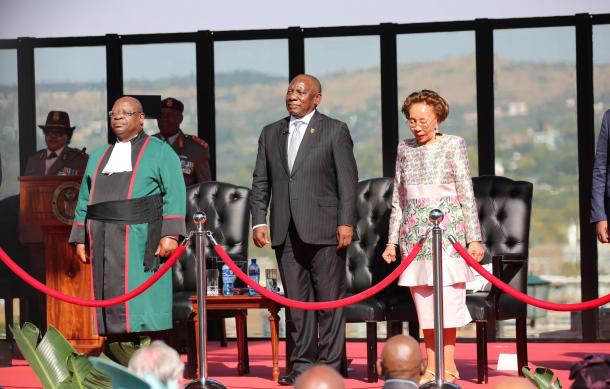
South Africa's President Cyril Ramaphosa has affirmed his resolute quest to build a growing and inclusive economy that offers opportunities and livelihoods to all people.
Ramaphosa was sworn in as President, following his re-election last week and the subsequent formation of the government of national unity.
Namibia's President Nangolo Mbumba, President Joao Lourenco of Angola, and Nigerian President Bola Tinubu are some of the leaders who witnessed the inauguration at the Union Buildings in Pretoria.
President Ramaphosa took the oath of office as President for the next five years, after a deal with the ANC's longtime rival DA and other smaller parties saw him re-elected by lawmakers during the Parliament's first sitting.
He has reiterated the acceptance and respect of the results of the elections, saying the will of the people shall be done without any doubt or question.
Though some parties, such as MK and EFF, have opposed the formation of the GNU, President Ramaphosa has vowed that nothing will be a distraction from serving the people and their interests.
"This is a new tide that heralds progress, transformation, and deep, fundamental change. We look to this rising tide with optimism and hope. We must reject every attempt to divide or distract us, to sow doubt or cynicism, or to turn us against one another. Those who seek to stand in our way, those who seek to inflame tensions, will not succeed, because South Africans are resolute. Those who seek to undermine our institutions will fail, because democracy lives in the hearts of our people and never be dislodged. Nothing will distract us from serving the people and advancing their interests. Now is the time to move forward. Together, we will do more and better."
However, the South African leader is not closing the door on working with political opponents.
Ramaphosa made it clear that all parties—civil society, labour, business, and other formations will form part of a national dialogue on the critical challenges facing the country.
" Above all, the people of South Africa have stressed that they are impatient with political bickering and the endless blame game among politicians and political parties. They want us to put their needs and aspirations first, and they want us to work together for the sake of our country. Today, I stand before you as your humble servant to say we have heard you. As the President of the Republic, I will work with everyone to reach out and work with every political party and sector that is willing to contribute to finding solutions to the challenges our country faces as we transition to a new decade of freedom."
President Ramaphosa has yet to announce members of the new cabinet.
This is not the first time that South Africa will be governed by a government of national unity.
In 1994, the late Nelson Mandela was sworn in as President , after which he announced the formation of a government of national unity between the ANC, National Party, and IFP as the main parties.
This was despite the ANC winning an outright majority of seats in the National Assembly and thus forming the government on its own.
The GNU deal's objectives included correcting the social and economic injustices left by the legacy of apartheid and overseeing the development of the final post-apartheid Constitution.





